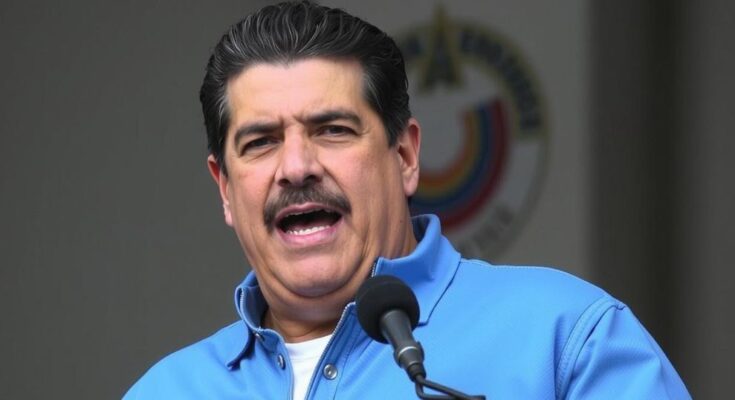Nicolás Maduro is set to start a third term on January 10, 2023, amidst allegations of a rigged election won by Edmundo González, who has garnered international recognition as the legitimate president-elect. The upcoming inauguration is met with skepticism, as widespread protests are planned against Maduro’s regime, which has criminalized dissent and instilled a climate of fear. The potential impact of a second Trump administration on U.S.-Venezuela relations further complicates the narratives surrounding Maduro’s governance.
Nicolás Maduro, the Venezuelan leader, is set to commence his third six-year term on January 10, 2023, during a swearing-in ceremony presided over by the congress, which is under his party’s control. This anticipation arises amidst severe doubts surrounding the legitimacy of the July 28 election where Maduro reportedly won by over one million votes, a claim widely disputed. Notably, Edmundo González, the opposition candidate, is believed to have achieved victory, with international observers, such as the U.S.-based Carter Center confirming the authenticity of the opposition’s tally sheets. “Maduro assuming another term… is a blatant violation of the votes of the Venezuelan people,” stated Jason Marczak of the Atlantic Council.
Maduro’s inauguration will solidify his governance approach amidst ongoing cronyism, rampant inflation, and food shortages that have plagued Venezuela for over 11 years. In response to Maduro’s upcoming term, the opposition has organized widespread protests; however, the pervasive fear instilled by the regime’s aggressive post-election crackdown on dissent, resulting in over 2,000 arrests, poses challenges to protest participation. María Corina Machado, a prominent opposition figure, is preparing for a public return to advocate against Maduro.
González, who has been recognized by the United States as Venezuela’s legitimate president-elect, faces persecution, having fled to Spain after an arrest warrant was issued against him. Recently, he has re-emerged from hiding, engaging in international efforts to galvanize support for Venezuelan opposition, including discussions with President Biden. As González attempts to rally international backing, he contends with a Venezuelan regime that has declared a bounty for information regarding his position.
With the prospect of a second Trump administration, speculation surrounds U.S. policy towards Maduro. During his initial term, President Trump adopted a confrontational stance towards Maduro; however, the dynamics may shift as Maduro expresses a willingness to engage with Trump. Former diplomat Isaias Medina III cautioned that any negotiations must prioritize Venezuela’s freedom, warning against the regime’s threat to regional stability through organized violence and crime. Meanwhile, experts suggest a potential shift in U.S. strategy under Trump, learning from prior approaches with adjustments to address the mounting migration crisis resulting from the Maduro regime’s governance. As Maduro consolidates power, the regime has strategically detained foreign individuals as leverage against the incoming administration, with allegations of serious crimes raised against them.
The context of this article revolves around Nicolás Maduro, who continues to lead Venezuela amidst allegations of electoral misconduct. Maduro has been critiqued internationally for his governance style, which many label as dictatorial. His impending inauguration follows a highly contentious election where significant opposition figures, including Edmundo González, claim to have received more electoral support. The political landscape in Venezuela remains fraught with tension as both domestic dissenters and international observers actively scrutinize the legitimacy of Maduro’s regime. The dynamics of U.S. foreign policy towards Venezuela are also evolving, with the anticipated shift in leadership under Trump reigniting questions about future diplomatic and economic strategies.
In summary, Nicolás Maduro’s impending third term inauguration signifies a continuation of his controversial leadership amid serious allegations of election fraud. The opposition’s challenges, characterized by protests and international support efforts led by figures like Edmundo González, highlight the strained political climate in Venezuela. As the Trump administration re-enters the discourse, the focus on effective strategies to address the Maduro regime’s suppression and the humanitarian crisis remains crucial. The coming months will be critical for both the Venezuelan populace seeking reform and the international community grappling with diplomatic relations influenced by Maduro’s governance.
Original Source: www.foxnews.com




